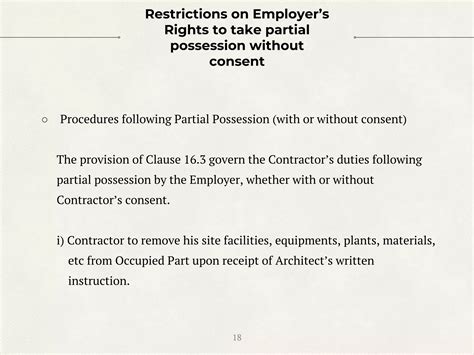Partial Possession: Negotiating Fair Terms
Partial possession agreements, where a buyer takes possession of a property before the sale is fully completed, can be advantageous for both buyers and sellers. However, navigating these agreements requires careful negotiation to ensure fair terms for all parties involved. This article will explore the key considerations and strategies for negotiating a successful partial possession agreement.
What is a Partial Possession Agreement?
A partial possession agreement allows a buyer to take possession of a property – perhaps to begin renovations, move in, or simply start enjoying the property – before the full purchase price is paid and the legal transfer of ownership is finalized. This differs from a standard sale where possession is transferred only upon completion of the sale. It's a complex legal arrangement, often requiring the assistance of experienced solicitors.
Why Would Someone Negotiate Partial Possession?
There are several reasons why buyers and sellers might opt for a partial possession agreement:
- Buyer's needs: Buyers might need early access for renovations, moving in before the closing date (e.g., due to a pre-existing lease expiring), or to start enjoying the property sooner.
- Seller's needs: Sellers might need time to find a new property before vacating the current one, or they may want to facilitate a smoother transition for the buyer.
- Market conditions: In a competitive market, offering partial possession can be an attractive incentive for buyers.
Key Considerations for Negotiating Fair Terms
Negotiating a partial possession agreement requires careful consideration of several key aspects:
1. The Period of Partial Possession:
Precisely defining the period of partial possession is crucial. The agreement should explicitly state the start and end dates, leaving no room for ambiguity. Any extensions must be agreed upon in writing and may involve additional fees.
2. Rent or Compensation:
This is a critical aspect. The buyer typically pays the seller a form of rent or compensation for the period of partial possession. The amount should be clearly outlined and reflect the fair market value of the property during that time. Factors to consider include the property's location, size, amenities, and prevailing rental rates in the area. This should be detailed in a legally binding agreement, not just a verbal understanding.
3. Insurance and Liabilities:
Who is responsible for insurance during the partial possession period? Typically, the buyer should secure appropriate insurance to cover any damages or losses to the property. The agreement should clearly delineate liability for damages or injuries occurring during this time. It's important to establish clear responsibilities to mitigate risk for both parties.
4. Utility Bills and Maintenance:
The agreement should address who is responsible for paying utility bills and undertaking any necessary maintenance or repairs. Normally, the buyer would be responsible for these during the partial possession period. Clear documentation prevents future disputes.
5. Security Deposit:
A security deposit might be required from the buyer to cover any potential damages to the property during the partial possession period. The amount should be reasonable and reflect the potential risks. The agreement must detail the conditions for its return.
6. Formal Legal Agreement:
It's imperative that a formal, legally binding agreement be drafted and signed by both parties. This should include all the terms and conditions discussed and agreed upon, leaving no room for misunderstanding or dispute. Seeking legal counsel is highly recommended for both buyer and seller.
What Happens if the Sale Falls Through?
The agreement should clearly outline what happens if the sale falls through. This should include provisions for the return of the property to the seller, the repayment of any compensation paid, and the resolution of any outstanding disputes. This contingency plan is vital to avoid potential legal complications.
How to Negotiate Effectively: Tips for Buyers and Sellers
- Consult legal professionals: Both buyers and sellers should seek independent legal advice before entering into a partial possession agreement.
- Document everything: Keep detailed records of all negotiations, agreements, and payments.
- Be realistic: Approach negotiations with a realistic understanding of market conditions and fair value.
- Communicate clearly: Maintain open and honest communication throughout the process.
- Consider mediation: If disagreements arise, consider using mediation to resolve them amicably.
Partial possession agreements offer flexibility but require careful planning and negotiation. By understanding the key considerations and employing sound negotiating strategies, buyers and sellers can ensure a fair and mutually beneficial arrangement. Always remember to seek professional legal advice to protect your interests.

